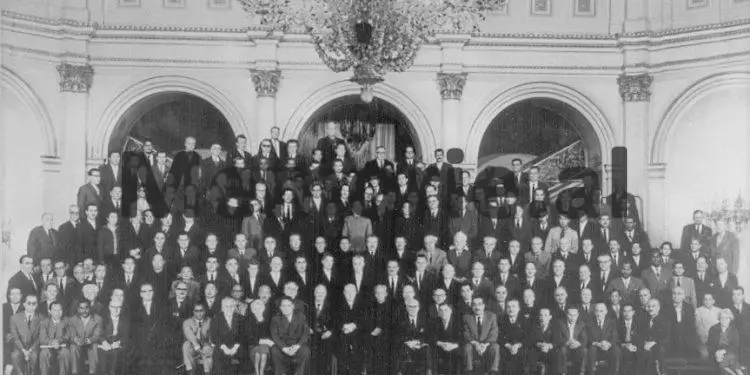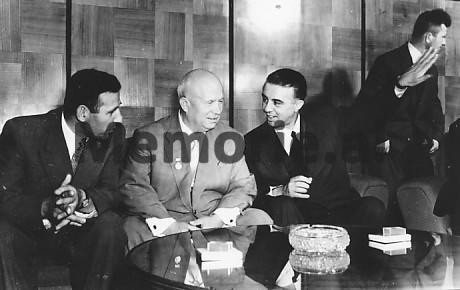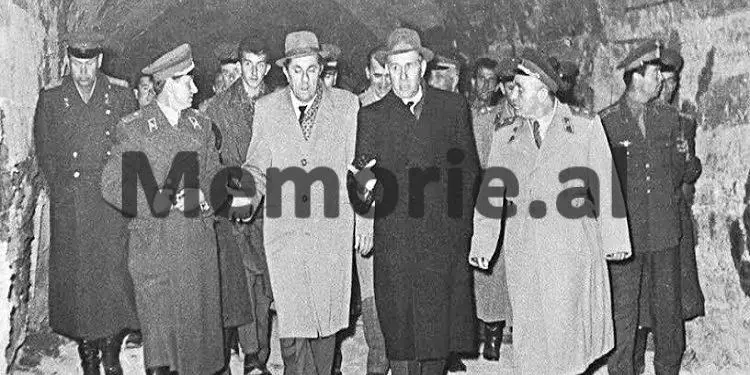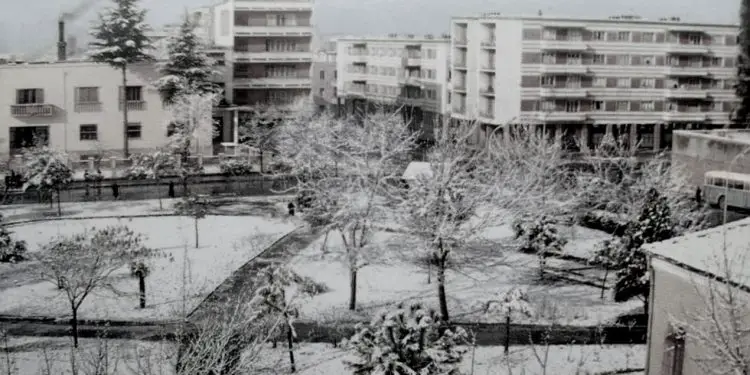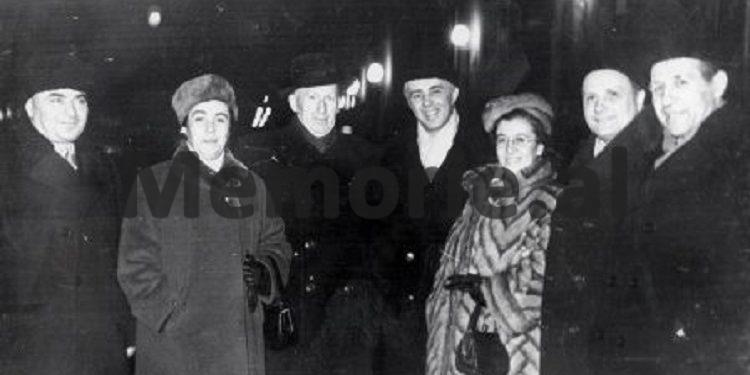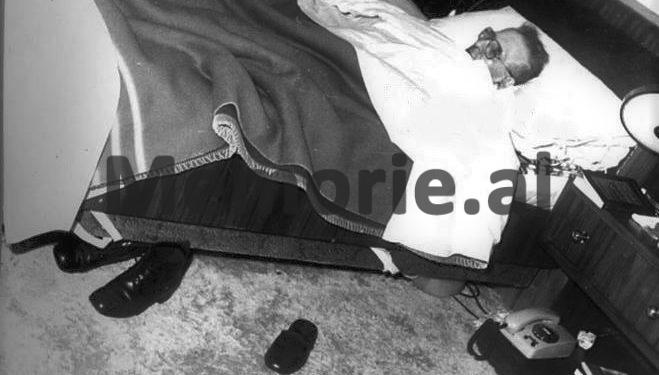By Ermira Isufaj
Urani Muçaj’s confession: “The biggest difficulty of my 30 years of work at PTT was in 1960, when we were informed from Moscow that Enveri would come by train”!
Memorie.al / After the unmistakable portrait of Zana, the switchboard operator in the film “White Streets”, all those whose youth caught the years of the dictatorship, remember today with nostalgia the queues and long waits at the PTT booths, to make a phone call. In the most classic cases, urgent telegrams were sent for cases of death, or the opposite, birth of children and family events. For anyone who lived through the years of communism, this is a picture served to you, as it was, without color…! The most difficult part has been met by the protagonists themselves, the switchboard employees who stood behind the transparent glass, between the communication cables and the headphones for the transmission of the voice, while they often listened to the complaints of the citizens, about the possible delays, until the phone calls were made.
Urani Muçaj is one of the “Fairies” of those years, who dedicated over 30 years of work to the profession of switchboard operator in the Directorate of PTT. Rightfully so, during the conversation she often tries to avoid the details, because according to her they now belong to an era that has passed, and in which she can no longer be interested, as long as advanced technology has alienated the practices of work, and especially that of communication between individuals. Precisely, more than a matter of legitimate curiosity, many people are interested in learning, especially, about the way telephone connections were made between high functionaries of the communist government!
How the radiograms arrived coded, while conversations on the ground between members of the Political Bureau were usually done by radio relay, with coded waves. The former employee of PTT reveals the “secrets” about work practices, from those with ordinary people to former leaders. The emergency radiogram that arrived after Enver Hoxha’s clash with Khrushchev, at the famous meeting of 81 communist parties in Moscow, announcing Enver’s “unusual” trip, as well as the ongoing claims of the former Prime Minister, Mehmet Shehu, for wiretapping phone calls, a few months before his suicide. Urani Muçaj, today 87 years old, confesses for our supplement…!
Mrs. Urani, let’s start with the memories from the war…! Before you distinguished yourself in your work as a switchboard operator, you were engaged in the National Liberation War. First, illegally, and then as a partisan, right?
We were a group of girls and friends who decided before they turned 15 to take the rifle and become part of the National Liberation movement. Initially, I was engaged in the Mallakastra detachment (since I was born in Fier), and then in the 11th Partisan Assault Brigade. From 1943, before joining the partisan formations, I acted illegally and my task, together with other war activists, was to collect food and clothing for the partisan forces and then deliver them to the Mallakastra detachment. But, in 1948, I was assigned to participate in the International Volunteer Brigade, which would go to Yugoslavia, to contribute to the construction of the country. We had Commander Nexhip Visha and we traveled to Zagreb. There the people gave us a grand reception, people had come out with bouquets of flowers, cheers, and they were very cordial.
Is that where you learned the trade of liaison?
During my stay in Yugoslavia for almost four months, in addition to volunteer work in the construction of railways, I was also engaged in the communication part, because even earlier in the choirs, but also as a partisan, I had learned how to use telephones, with tubes and large batteries. , which were reviewed. During the war, normally we gave signals, not directly, but with slogans. But, during these days of stay in Yugoslavia, an urgent radiogram arrives from Albania: “Tito betrayed! Prepare the slogans, tougher against him”! We immediately set in motion, to implement the received order, and the next day we left directly for Tirana. The Yugoslav people ignored us, ignoring us with no follow-up and no thanks for the work we did there, for months. The only memory I had was a medal of honor, given to me by the Yugoslavs, it was called “Udarnik”.
Then, you came to Tirana…! How did you get hired at the Directorate of PTT?
Normally, it was the Party that organized me into this job. Being a communist, with a third party, but also with ideals, moreover I had given evidence of knowledge in the communication sector; I was assigned to start work as a switchboard operator. I started working in 1955 until 1987, close to retirement age. But the communication sector was not an easy task. Because, apart from knowledge and skill, the default condition was that of keeping secrets. So, everything was talked about, called, or about every situation that was discussed within the workplace, among colleagues, not even the smallest information should come out. I, not even my husband, told them about the things that were happening there at PTT, because the leak of information was considered a conspiracy and then the entire staff was put in the “hole of the needle”.
The telephone connection between individuals, the common people, was made with classic bands and headphones, which helped to convey the voice. Then, people spoke in the designated booths, according to the numbers and according to the circle with which the connection was made on the phone, that is, within Tirana, or even with different cities of Albania. Requests for phone calls were numerous during the day and we, as switchboard operators, tried to fulfill the vast majority, since telephone cables were damaged by atmospheric agents, such as wind, snow in winter, rain, etc. In those years, communication was either wired or wireless. The apparatus was not sophisticated. They were mostly bought from China, or from the Soviet Union.
As for the apparatuses and communication lines of leadership, things work differently, don’t they?
Much different, definitely! In those years, there was what was called the “underground city” in our language. From the center of Tirana, somewhere near the Bank of Albania, to Dajti Mountain, there were underground tunnels, where specific communication lines were installed, mainly those of the leaders. Telephone devices, those of the government, ministries, and many others, all worked in this underground city, while the people did not even know that such a thing existed.
The wave and cable lines were separate for the villas of the rulers, for the ministries, for their families, etc. I had heard that these underground tunnels were very large, where among the stretched cables, signal lines and devices, there were places separated by rooms, where the communication specialists worked, and even there they had hired cooks, who cooked for the shifts at night, during the day, because employees during working hours were not allowed any contact with the outside, or any interruption during work, for personal needs. Everything was done under complete surveillance and secrecy.
Under what technical conditions was the telephone connection with the communist leaders made?
Telephone and telegraphic communication with former senior communist leaders was carried out in a special section. It was not a question of defects, but even if they occurred for well-explained reasons, it was at least intended by our staff that they be minimized as much as possible. Enver Hoxha, Mehmet Shehu, Hysni Kapo, Kadri Hazbiu and almost all members of the Political Bureau had special cables for communication.
They even had specific telephone and telegraph lines in the villas where they lived and others in the ministries and work offices. The effectiveness, the purity of the voice, had to be at the right height, because mistakes were not easily forgiven. There were almost 60 secret numbers installed, at the service of all communist functionaries. While, from our side, we, as the centralist, proved meticulous, in every request of theirs, to be connected within Albania, or even abroad.
So it was a coded, secret communication?
Everything almost resembled a secret communication, with specific codes and numbers that only we employees knew, and that they were used for a certain period of time, to be changed later with other codes and numbers. This was one of the tactics used to maintain quality and secrecy in the telecommunications sector. That is, I, as an employee, and my colleagues, had the details classified: We called them work codes, but categorized into those of the people, and those of the leadership (completely secret).
While the channels in which the telephone line was laid, specifically with the leadership, was called the high frequency line. As switchboard operators, we had also received orders for specific details…! For example, it could happen that an important order came with an official letter about the conversations of Prime Minister Mehmet Shehu, or even other members of the Bureau, and I made a special telephone connection, of the type: I listened to the functionary’s conversation from the side the other end of the phone, but he wasn’t listening to me. This happened rarely, but with certain movements of the tapes and combination of codes, it became possible in a certain way to “surveillance” certain telephone conversations of communist leaders. You had a job with a lot of responsibility…!
What was the most secret communication you had with former communist officials?
There is a difference at this point…! The connection mainly with the greats of that time, from Enver Hoxha, to Kadri Hazbiu and all the communist leaders, was not realized directly with us employees, but with our superiors, located in the departments and offices of the PTT. It happened that the signal came directly to me, and if I was asked on the other end of the phone, one of my colleagues, or my superiors, I immediately passed the line. Being an operator in the Directorate of PTT, has been a job with daily pressure and a lot of tension. Communication was at the beginning levels, and there were often gossips and unexpected things, from which you learned something new every day. As I stated above, communication with members of the Political Bureau was done with secret codes and numbers, which were changed from time to time.
I remember one of the spiciest moments in my 30 years of working at PTT. It was November 1960, and the famous meeting of 81 communist parties took place in Moscow, among them the Albanian one, which had its own representative delegation, headed by Enver Hoxha. During the developments of the meeting, the news came out that Enveri had strong clashes with Khrushchev, and together with Mehmet Shehu had left before the end of the meeting. In the Directorate of PTT, the urgent radiogram arrives with the secret message, which explained what happened in that meeting, and the other unusual detail, that Enveri, to avoid any possible assassination, had not traveled on the government plane with the pilot his confidant, Babaçe Faiku, but was headed towards Albania, by train.
How did you pass this information on then?
This news alarmed not only the management structures of PTT, but immediately after that, all the personnel were called to the meeting. The direct order that was given to us, from the former technical director of PTT, was that, categorically, not even a single detail from this unusual and unexpected event should come out of work. The news was coded at the moment and sent to the relevant ministries. For me, as a PTT employee, it was one of the most stressful moments at work and with a lot of responsibility, not only individually, but also collectively.
You have also experienced the event of 1981, the suicide of Prime Minister Mehmet Shehu. How was this sensational news communicated in your institution?
Before the news of Mehmet Shehu’s “suicide” reached us, we had heard in several meetings of PTT superiors, chief engineers, and especially those who worked for high frequency lines, that the Prime Minister had raised the claim that the conversations his telephone numbers were tapped. And he made this statement after hearing strange noises while talking on the phone.
In fact, legally, it was known that the telephone conversations of communist leaders, generally of individuals with a governing mandate, were forbidden to be tapped?
Something like this was specified in the official documents, but in practice, the opposite happened. His claim of interception of phone calls, whether they were in the residential villa, but also in the office, or often even the radio relays that the communist leaders used with each other, whenever they happen in the field, had come after the first contradictions and the cooling of the reports with Enver Hoxha. This claim was expressed orally, but it also came with an official letter.
So a specific intervention and re-check was needed, by the most skilled PTT engineers, to pinpoint any possible defect in the line and to resolve Mehmet’s dissatisfaction. Immediately, the next day after the letter, the appropriate specialists were sent, who, as they later reported, made remote measurements, mainly of the wireless lines in Mehmet’s villa, and where no possible defect was found, but at the same time they intervened technically, the improvement of the high frequency, the line where the communication waves of the communist leaders passed.
Did something change after the death of Enver Hoxha?
The spirit of liberalization was felt immediately, with the appointment of Ramiz Ali, Enver’s deputy. There were no more lightning, unexpected visits to PTT, and especially to the directorate of our institution. The conversations started to be freer and not so monitored, I mean mostly, about the connection with the communist leaders. The first practices for the modernization of equipment and technology began, with new and more innovative purchases, but still incomparable to what they are today. I cannot deny that work practices became easier, but I would retire just two years after the death of Enver Hoxha.
What about today’s communication: fax, cell phones, I-phone, I-pad…! It sounds like you’ve been working in tech for years, right? A lot of setbacks, there were in those years…?!
Be it informative, or even for the tools we used to work with were very outdated, impractical and difficult to use. As a switchboard operator, I had the cables, headphones, pipes in other cases in the field. These tools depreciated quickly, due to the pace at which we worked. It is accepted that over the years, systems evolve, technology in every field of life advances, so these days communication has become easier and more practical. At least I am happy that I made it to the day to see all these advances for myself, especially in the field where I have contributed for more than 30 years. Memorie.al




